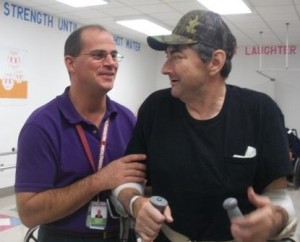
PLEASANT GAP – “I’m an independent man, and I want to stay that way,” says Russell Trego Jr., 58. That is a common sentiment among many people facing rehabilitation after an injury, illness or surgery.
Russell recently fell at home and broke his hip, and when it was time for rehabilitation, he chose HealthSouth Nittany Valley Rehabilitation Hospital in Pleasant Gap.
“Two years ago I was at HealthSouth to get strong after a long hospital stay left me feeling weak and unsafe to live alone,” says Russell. “In 18 days, I went from being in a wheelchair to walking out on one crutch. That’s why I’m here again.”
Rehabilitation after hip surgery did not begin easily for Russell.
“The first day in therapy, the pain was so bad that I wanted to give up. I thought I would never walk again,” says Russell. “But my Aunt Mary said some things to me that were very motivating. I live alone, and I don’t want to be a burden to anyone, especially my children.”
Russell, who has four children and seven grandchildren, says that instead of fighting the pain, he learned to go to another place in his mind. “I imagined that I was with my grandson and granddaughter, and it worked,” he said. “I was able to deal with the pain and move forward in my therapy.”
In addition to a broken hip, Russell has a heart failure diagnosis. “At HealthSouth, when a patient is admitted for rehabilitation (for whatever reason), and that patient has a heart failure diagnosis, they also get the benefit of our Heart Failure Program,” says Amy Adams, Russell’s case manager.
HealthSouth’s Heart Failure Program has earned the Joint Commission’s Disease-Specific Care Certification. The program includes classes that teach patients about managing fluid intake and medications, and the importance of daily weight monitoring. “I’m learning how to manage my heart failure diagnosis when I go home,” says Russell. “I want to be able to take care of myself again.”
Nurses use the “teach-back method” to educate patients about daily weights and what weight gains to report, foods to avoid, the name of their water pill, and other signs and symptoms to share with their health care providers.
Case managers also ensure that a heart failure patient has a follow-up appointment with their primary care doctor. “We call the patient four days after discharge, and again 30 days after discharge,” says Adams. “That follow-up after the patient is discharged helps to prevent re-admission to the hospital.”
Patients with a heart failure diagnosis also participate in their rehabilitation goals through the “Road to Recovery” board in their rooms. Nurses and patients change the board as patients achieve milestones and reach goals.
Russell’s goals include walking again, living independently at home, and successfully monitoring his heart failure diagnosis. “My dad always told me, ‘No is not in your vocabulary,’ so I always try my best.” HealthSouth Nurse Jackie Tepsic, LPN, who cared for Russell, adds, “Russell’s positive attitude is what makes him a great candidate for rehab. He never says ‘no’ and is willing try anything to get better. That’s what helps a patient like Russell go home again.”
HealthSouth’s Heart Failure Program includes a monthly support group, which is open to the public and held on the fourth Monday of every month at 4 p.m. at HealthSouth. The group is led by Traci Curtorillo, CRRN®, nurse manager and the Heart Failure Program champion. For more information, call 814-359-3421 or 800-842-6026, or visit www.nittanyvalleyrehab.com.